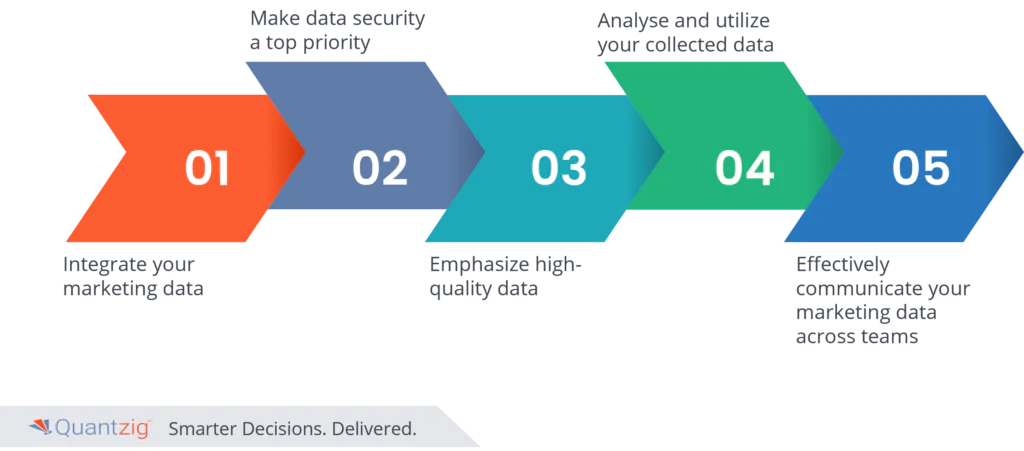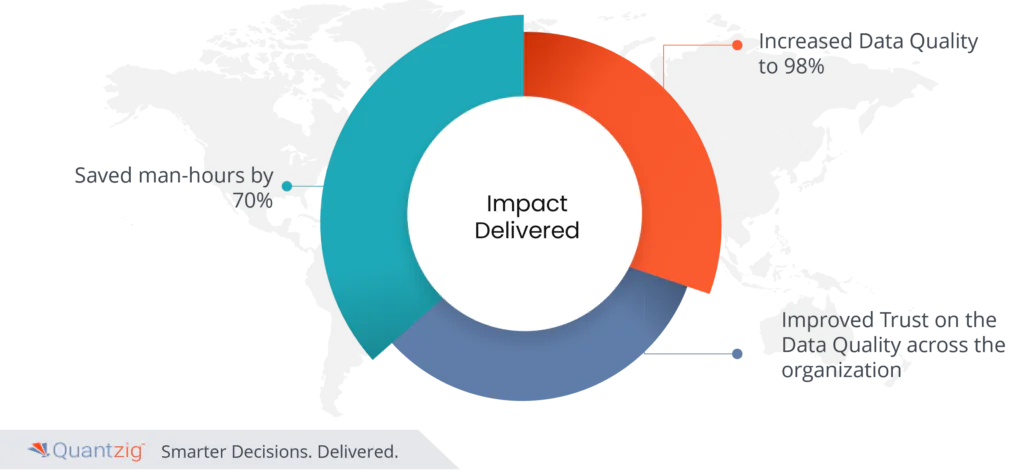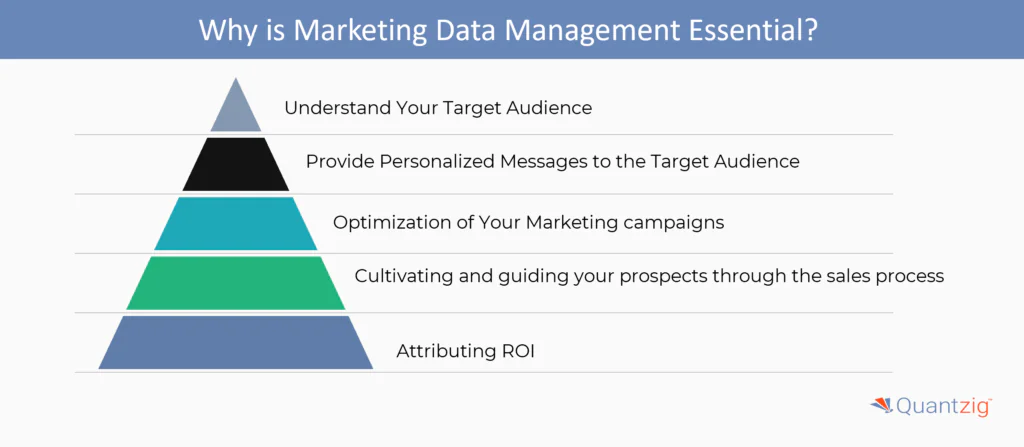Written By: Sudeshna Ghosh
Table of Contents
Key Takeaways for Marketing Data Management
- Quantzig’s innovative marketing data management solution helped a global retailer save man-hours by 70%, increase Data Quality to 98%, and improve trust in the Data Quality across the organization.
- Marketing data management forms the foundation of data-driven marketing. By guaranteeing precise, uniform, and obtainable data, MDM enables marketers to gain a more profound understanding of their customers, enhance marketing campaigns, and accomplish their marketing objectives.
- Adopting proven methods for managing marketing data, such as combining data sources, prioritizing data security, focusing on high-quality data, conducting thorough analysis, and enabling clear communication between teams, leads to insightful, and actionable data-based decision-making for enhanced marketing plans and improved business results.
- Managing marketing data comes with challenges, such as following constantly changing regulations and difficulty using and enabling data because systems are isolated in silos. This emphasizes the importance of strong data management practices to ensure regulatory compliance and optimize efficient use of data.
Introduction
Nowadays, businesses are continuously collecting and generating a huge amount of data but managing that data can be highly challenging. The more data you will be storing, the harder it will be to understand what data you have and extract more value to drive successful marketing campaigns. Marketing budget optimization is a systematic process of collecting, organizing, and protecting any organization’s data to analyze and extract data-driven insights. In this post, we’ll discuss a case study on how Quantzig’s innovative marketing data management solution helped a global retailer save man-hours by 70%, increase Data Quality to 98%, and improve trust in the Data Quality across the organization.
Book a demo to experience the meaningful insights we derive from data through our analytical tools and platform capabilities. Schedule a demo today!
Request a Free DemoQuantzig’s Success Story
| Client Details | A Global Retailer with a diverse product line and a global customer base. |
| Challenges Faced by The Client | 1) Lack of data structure and formatting. 2) Low data quality. 3) Inconsistent formats and quality. 4) Added quality control effort to ensure proper data harmonization. 5) Delayed and low-quality insights resulting in lower insight usage. 6) Lack of data automation for processing and managing data quality. |
| Solutions Offered by Quantzig | We implemented a Centralized Marketing Data Platform, a centralized Marketing Data System, leveraged low-code platforms, and created an automated data governance module. |
| Impact Delivered | 1. Saved man-hours by 70%, 2. Increased Data Quality to 98% and 3. Improved Trust on the Data Quality across the organization helping in higher consumption of data for downstream purposes and insights generation |
Client Details
A Global Retailer with a diverse product line and a global customer base.
Challenges in Marketing Data Management Faced by the Client
Our client is a global retailer who was encountering difficulties with having high-quality data. They had to put in a lot of manual effort to process and manage the quality of their data. They also regularly encountered data quality issues due to changes in data formats, missing data, incorrect mapping, and other factors. Since their data originated from multiple sources, it was integrated and further processed to gain marketing insights and populate their dashboard. The key challenges were:
1) Lack of data structure and formatting; 2) Low data quality; 3) Inconsistent formats and quality; 4) Added quality control effort to ensure proper data harmonization; 5) Delayed and low-quality insights resulting in lower insight usage; 6) Lack of data automation for processing and managing data quality.
Marketing Data Management Solution Offered by Quantzig for the Client:
- We built a Centralised Marketing Data Platform by streamlining all the data sources and putting a layer of automation across the data management to ensure that 70-80% of Data Management is Automated. We used low-code platforms to build a deploy the solution within a few months which helped the client save man-hours by 70% and increased the data quality to 98%. We also built an automated data governance engine which ensured that all the governance checks were done at source avoiding any issues during Audits. Automated DQM coupled with Automated Harmonization helped in building a robust centralized data delivery platform.
- We developed a Centralized Marketing Data System by consolidating all the data sources and implementing automation for data management, ensuring 70-80% of the process was automated.
- We leveraged low-code platforms to deploy the solution rapidly, within a few months, which helped the client reduce labor hours by 70% and improved data quality to 98%.
- We also created an automated data governance module that performed all governance checks at the source, avoiding audit issues. The combination of Automated Data Quality Management and Automated Data Harmonization enabled a robust centralized data delivery framework.
Impact Delivered using Quantzig’s Expertise:
- Saved man-hours by 70%,
- Increased Data Quality to 98% and
- Improved Trust on the Data Quality across the organization helping in higher consumption of data for downstream purposes and insights generation
Also Read: Maximizing Marketing Budgets with Campaign ROI Analysis
Get started with your complimentary trial today and delve into our platform without any obligations. Explore our wide range of customized, consumption driven analytical solutions services built across the analytical maturity levels.
Start your Free Trial TodayBut What is Exactly Marketing Data management?
Marketing data management is a systematic process of collecting, organizing, and protecting any organization’s massive volumes of data to analyze and extract data-driven insights from those data. Organizations collect a large volume of data from many touchpoints with customers, such as marketing efforts, customer interactions through products or services, websites, social media platforms, and customer relationship management (CRM) systems. As the volume of data grows, data management becomes crucial to help organizations make sense of it all.
This process aims to provide centralized oversight of an organization’s data. Data frequently resides in disconnected systems and platforms across different departments. This fragmentation makes it hard to get a complete picture of the full breadth of a company’s data assets. Data management brings together data from various sources into a unified whole. This consolidation improves data quality, accuracy, marketing strategies, availability, accessibility, and security. Combining data from multiple sources creates a single authoritative version of the truth. This allows companies to build more comprehensive customer profiles, analyze marketing metrics, and increase the value of their offerings. In summary, data management gives organizations control over their data to gain more insight and better serve customers.
Why is Marketing Data Management Essential?
As technology progresses and provides more digital ways to engage with customers, businesses accumulate extensive data. But this information is useless if companies can’t structure it, comprehend it, and use it to guide business decisions.
Implementing a strong marketing data management plan and activating that data unlocks many advantages for companies, such as:
1. Understand Your Target Audience
Diving the overall market into personas and actionable targeted customer segments requires data. That’s because you can only decide which segmentation traits are most applicable for your market with data.
To comprehend the resemblances and variations amongst your audience that will influence your marketing plan, you need a thorough grasp of them.
After forming your personas, data enables you to profoundly understand their identities and difficulties. This information will assist you in creating a focused and result-driven marketing approach for each customer group.
2. Provide Personalized Messages to the Target Audience
Customize your outreach further than just personas by making messages based on someone’s specific experiences with your business. What have they bought from you before? Which pages on your site did they view?
For instance, Spotify generates playlists tailored to each individual user according to their listening patterns.
Gathering information, combining it together, and utilizing AI-powered marketing technology (martech) and competitor intelligence allows you to automate personalization down to a detailed level.
This degree of personalization or deliver personalized messages is crucial in grabbing your audience’s focus and pleasing them.
3. Optimization of Your Marketing campaigns
When you understand how your marketing campaigns impact revenue, you can make adjustments in real time to get more from each one.
Look at the paid search campaign in the example. Let’s pretend it has high returns on investment but lower baseline revenue than other marketing approaches. With unified, organized data, you might spot patterns that provide insights to further improve this campaign.
You could A/B test multiple changes and use real-time data to see how the new versions influence results overall. Do the changes help reach a target audience better? Do they increase conversions or customer retention?
Leverage your findings to implement the most effective optimizations for your campaigns!
4. Cultivating and guiding your prospects through the sales process
The advantages mentioned above all contribute to lead nurturing. If you comprehend your target groups, customize your engagements with them, and enhance your marketing efforts, you can also foster leads more effectively through the sales pipeline.
A robust data administration plan will assist you in understanding your viewers overall and individually.
You’ll utilize past information to see which content pieces and channels work most optimally for each sales pipeline phase and each audience segment. After that, apply those findings to future leads. Ongoing enhancement driven by data will assist you in making your further lead nurturing procedure more efficient.
5. Attributing ROI
When your campaign starts to generate results, you need to attribute the campaign to the right marketing channels. Proper ROI calculation and attribution will help you communicate the various marketing channels’ values to secure your future marketing budgets. Furthermore, data-driven marketing practices lead to at least a 15-20% increase in marketing ROI, making it a useful tactic for increasing your business profits.
CDP vs DMP
Customer Data Platform
A customer data platform (CDP) is a marketing technology that brings together and combines data from many different sources into one single, joined source that provides you with a full picture of each customer. It works behind the scenes to combine and organize customer data and make that data ready for use.
Data Management Platform
A data management platform (DMP) is advertising-specific software. It does not store a company’s own customer data but rather collects and organizes data to construct anonymous user profiles using information purchased from other companies and external sources. DMPs help companies gain more precise insights into their target audiences to reach specific users and contexts more effectively. A customer data platform (CDP) helps DMPs by enabling them to leverage a company’s proprietary data to generate more accurate ad targeting.
The main distinction between DMPs and CDPs lies in the kinds of data each platform focuses on. CDPs primarily utilize a company’s own and zero-party data, while DMPs mostly work with third-party data.
What are the Potential Challenges of Marketing Data management?
The high speed of modern business operations and the massive amounts of data they create present an increasingly difficult challenge for data management. There are several key issues companies face when managing their data.
1. Comply with ever-changing data requirements:
Complying with changing privacy and data protection laws is complex and requires ongoing attention. Failing to properly handle customer data according to evolving regulations can result in major fines or legal problems.
2. Difficulty to access and activate data:
Accessing and making use of data is also problematic in many firms. Data is frequently isolated in silos, with different teams working from separate data sources. This makes it harder to know what data exists, where it is kept, and how it could be utilized. It also slows down users’ ability to obtain the information they need and hampers real-time customer insights and customer acquisition. Implementing proper data management practices helps avoid these issues.
What are the Best Practices of Marketing Data management?

Adopting effective data management procedures can help minimize the chances of inaccurate data and guarantee your data stays of high quality. Consider these recommended data management best practices:
1. Integrate your marketing data
As noted, one of the big difficulties of marketing data management is disconnected data. Customers engage with your company through various contact points. Data can be leveraged more efficiently if it’s combined from all sources so it can be examined together. This enables you to see the entire customer experience to better pinpoint patterns and situations.
2. Make data security a top priority
When gathering customer information, it is crucial to follow the laws and rules around data security and customer privacy. Ensure that all relevant parties comprehend these prerequisites to guarantee your data management system stays compliant.
3. Emphasize high-quality data
Be mindful of the data you collect. Quality input data leads to quality output data. Outdated or imprecise data can impact the correctness of your marketing analytics and decision-making. Examine data for inconsistencies, incorrect formatting, spelling errors, duplicate entries, and train staff to input data accurately to ensure your data retains its data integrity and value over time.
4. Analyze and utilize your collected data
To maximize the value of your data, you must thoroughly examine it. Consolidating and organizing your data makes analysis and activation easier. You can leverage the insights gained from analysis to tweak and enhance marketing tactics or devise new ones based on data patterns and inclinations.
5. Effectively communicate your marketing data across teams
Effective marketing necessitates considerable cooperation between teams throughout the company. Marketing teams must communicate discoveries with product development and sales divisions as well as leadership. Summarizing data into actionable reports for each department facilitates cross-company teamwork, improve market research, analyze marketing metrics, increase customer acquisition and customer retention, and assists them in comprehending how your marketing efforts impact their personal goals.
Also Read: Track Business Progress with Marketing Analytics Dashboard
Experience the advantages firsthand by testing a customized complimentary pilot designed to address your specific requirements. Pilot studies are non-committal in nature.
Request a Free PilotHow to Move Forward with Effective Marketing Data Management?
From this case study, you’ve already learned all about marketing data management – the pros, cons, and best practices for getting the most value from your marketing data. What’s next? Consider implementing a successful customer data platform (CDP) to manage your marketing data. A CDP is the first step towards leveraging your marketing data to create valuable customer experiences. It can also help you tackle the hurdles of collecting and unifying customer data, making it more accessible for marketing teams so they can deliver relevant messaging and products to the right customers. When used alongside a data management platform (DMP), a CDP allows you to utilize types of data like personally identifiable information (PII) that a DMP can’t use alone. This gives you the most accurate data for advertising and targeting.
If you need a more comprehensive view of your customers and their lifecycle, connect with one of our CDP experts.
Conclusion
In a nutshell, having a successful marketing data management strategy is essential for all types of companies that want to prosper in today’s data-driven business world. By integrating marketing data management approaches, businesses can unlock the full potential of their data to drive long-term sustainable growth, optimize marketing strategies, gain actionable insights, analyze marketing metrics, and enhance customer experiences. Every step in the marketing data management process, from data collection and data integration to analysis and interpretation, plays a pivotal role in unlocking valuable information.
With the accurate technologies, tools, and methods in place, organizations can optimize resource allocation, streamline their marketing efforts, and stay ahead of the competition. By prioritizing data quality, data security, and compliance, businesses can ensure their data remains an asset that fuels well-informed decision-making and drives strategic initiatives. Therefore, effective marketing data management is not just about managing a huge volume of data – it’s about turning data into a strategic advantage that boosts business success.






